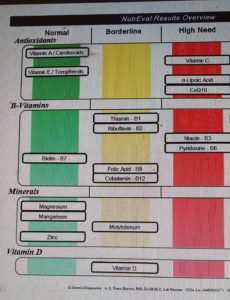Nutritional Therapy
I have found over many years that Nutritional Supplementation can be extremely effective when correctly used. It can help with the following:
- Reducing inflammation – from injuries, back pain, gut pain
- Healing the gut and improving digestion
- Rebalancing biochemistry – many vitamins and minerals are co-factors that enable enzymes to function properly. Hormones require specific nutrients to function properly.
- Assisting detoxification – specific vitamins are required for the different detoxification pathways
- Supporting hormone function – certain vitamins and minerals can help with PMT, menopause
- Increasing energy levels
One of the areas that is fast gaining popularity all over the world is providing nutritional support for the body’s detoxification processes.
Even though it’s recognised that the body is designed to detoxify and eliminate toxins, it’s now recognised that it cannot always handle the over load of toxicity that is present in our environment. A toxin overload can lead to many debilitating health problems: headaches, muscle and joint pain, chronic fatigue and recently toxicity has been linked to cancer.
It is estimated that more than 84,000 chemicals are used in household products, cosmetics, foods and food packaging which have never been tested for safety!
Nutritional supplementation can be crucial for supporting the body to detoxify the constant stream of everyday toxins that we’re all exposed to on a daily basis. We’re exposed to them through air and breathing them in, through our skin from the products we apply and of course from what we eat.
- Benzene from petrol fumes
- Bisphenol A [BPA] from food cans and plastic packaging
- Out-gassing from new carpets, new wood furniture
- Household cleaning products
- Wood floor finishes
- Pesticides on food
- Cigarette smoke
- Artificial sweeteners
- Alcohol
- Caffeine
- Non stick pans, aluminium cooking pots
And many more
Of course, it’s important that we get the basics right. That means we look at your diet, what you have for breakfast, lunch, supper, all the snacks and drinks you have.
We look at your energy levels and if there are foods that could be depleting your energy. Keeping your blood glucose levels balanced is very important to maintain good energy levels.
Are you getting enough anti-oxidants in your diet or through supplementation? What about key minerals and vitamins? How much water do you drink?
Your ability to remove or detoxify toxins is an important factor in being susceptible to toxin related health conditions.
Using lab tests for nutritional deficiencies is extremely useful because results are measureable.

